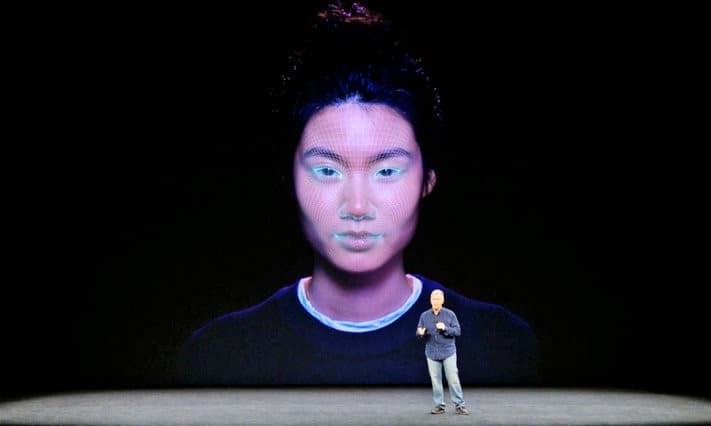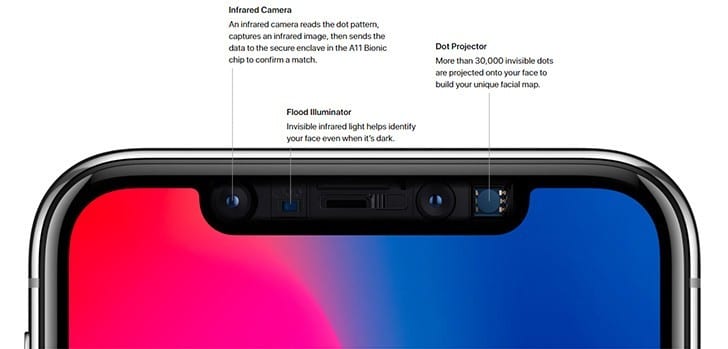If you’ve managed to get past the iPhone X’s price, then you’re probably aware of the latest security feature in Apple’s flagship. But at $999 for its basic 64GB model, we don’t blame you if you haven’t. The upcoming iPhone X is the first of many iPhone generations to have Face ID. While it represents an innovative new direction for the company (and for technology at large), Face ID isn’t without its critics.
IMAGE: APPLE
Face ID’s Mysterious Beginnings
To give it a little context, let’s delve into the production history of the X. The first indication the commemorative iPhone would lack Touch ID came back in the summer when reports suggested the home button was impeding a true edge-to-edge display.
[pullquote]No one was sure how they would resolve this issue, and each leak claiming to divulge Apple’s decision contradicted the other.[/pullquote] Many thought Touch ID would find a new home on the back of the phone, where it would still scan a user’s fingerprint to unlock the device. Others thought this was the inevitable demise of the home button, the next step in a journey first started by the iPhone 7 and 7 Plus.
Later in the fall, Apple confirmed the loss of the home button at their September 12 keynote. In the iPhone X’s big reveal, Apple demoed the innovative security feature set to replace it: Face ID. Like how the Touch ID uses unique biometric data from your fingerprint, Face ID scans the individual landscape of your facial features to allow access to the phone.
The iPhone 8 and 8 Plus, on the other hand, retain the old, front-facing Touch ID, despite sharing with the X a nearly bezel-less design and glass body. The glass body ensures the handset is capable of wireless charging, but the material used is easy to smudge and scratch with basic daily use. Despite Apple’s confidence in the material, it’s performed poorly on several drop tests.
Though the glass is a necessary change from the aluminum of previous generations, it only takes a few days before it shows the evidence of use. If you’ve opted for the 8, you need to protect your iPhone 8 body with an iPhone 8 skin. It’s a thin accessory that applies directly to the phone (or onto a skin-enhanced grip guard) to camouflage any existing marks while protecting the glass from future smudges, scratches, and other cosmetic damages.
IMAGE: APPLE
How Face ID works
In the most basic terms, Face ID uses the iPhone’s camera to take a picture of your face anytime you try to open your handset. If it matches the original scan, Face ID will let you in. In its essence, it’s similar to any other smartphone that relies on facial data as security.
Once you go beyond the surface, you’ll find Face ID isn’t like the facial recognition software available in other phones. Samsung uses a basic selfie cam to snap a pic of your face, which is why it’s easily fooled by low-light environments and flat photographs.
The technology behind Face ID is a little different. The iPhone X’s TrueDepth sensor combines the typical ambient light and proximity sensors with an infrared camera, flood illuminator, and dot projector. TrueDepth can illuminate your face while projecting 30,000 infrared dots that map and record your face. It compares any future readings to this initial map to decide whether the face of the person opening your phone is, in fact, you.
Since its master map of your face is a 3D rendering, you can’t trick the TrueDepth sensor with a photograph. The sensor won’t unlock when you’re sleeping, either, because your eyes need to be open when it completes a scan.
Apple claims Face ID is far superior as a security feature than Touch ID. They estimate there’s a one in a million chance at jailbreaking Face ID, while there’s a one in 50,000 chance that someone could trick Touch ID. It also uses machine learning so that it can adapt its master map as you age, change your hairstyle or glasses, or grow a beard.
It May Be Secure, But Face ID Isn’t Flawless
While it may be the most secure protection on a phone yet, it does bring up other concerns. In order for its TrueDepth sensor to be able to unlock your phone ready at a moment’s notice, it needs to be scanning for your face constantly. Millions of people took to Twitter with their concerns about constant surveillance, calling Face ID a creepy, if futuristic, addition to the phone.
[pullquote]In this political climate, there are skeptics who worry this feature makes it easier for law enforcement officers to unlock people’s phones unlawfully.[/pullquote] All they’d have to do is seize the handset and force the owner to face the sensor.
Then there are ethical concerns that have many people worried about how Apple plans to use saved facial data, though these may be unfounded. Apple says it stores your face scan to the Secure Enclave of the phone. This co-processor has its own encrypted memory that makes it impossible for Apple and third-party app developers to access your facial data.
Whether these concerns are valid remains to be seen until the official launch and the widespread sale of the iPhone X. With production delays, this could be as late as early 2018. Until then, critics, customers, and comedians will speculate about its abilities.
If you haven’t already watched Funny or Die’s bit with the actors from Silicon Valley, then you definitely should. Follow that up with the Conan O’Brien skit. Though you may not be any better informed after watching them, you’ll at least be in a better mood as you await the New Year. Face ID has the potential to be a revolutionary security feature. It’s just a matter of whether it lives up to its reputation in practice in 2018.
If you are interested in even more iPhone-related stories and information from us here at Bit Rebels then we have a lot to choose from.


COMMENTS